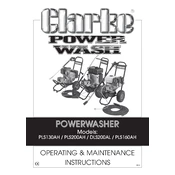Clarke 7330260 PLS130AH Diesel Power Instructions


To start the Clarke 7330260 PLS130AH, ensure it is filled with diesel fuel and engine oil. Turn the power switch to the 'ON' position, set the throttle to the 'START' position, and pull the recoil starter handle firmly.
Check for blockages in the nozzle or hose, ensure the water supply is turned on, and inspect the inlet filter for debris. If the issue persists, check the pump for any internal damage.
Regularly check and change the pump oil according to the user manual. Clean the inlet filter and ensure the water supply is free from debris to prevent damage to the pump.
Use fresh, clean diesel fuel that meets the specifications outlined in the user manual. Avoid using biodiesel or any fuel with additives not recommended by the manufacturer.
Change the engine oil after the first 5 hours of operation and then every 50 hours or annually, whichever comes first, to ensure optimal performance and longevity.
Drain all water from the unit, including the pump, hoses, and nozzles. Add a fuel stabilizer to the diesel and run the engine for a few minutes. Store in a dry, covered area to prevent rust and damage.
A leaking pump may be due to worn seals or a crack in the pump housing. Inspect the pump for visible damage and replace any faulty components as necessary.
No, the Clarke 7330260 PLS130AH is designed for use with cold water only. Using hot water can damage the pump and other components.
Check all electrical connections for looseness or corrosion. Ensure the battery is fully charged and in good condition. Inspect fuses and replace any that are blown.
For heavy-duty cleaning, use a nozzle with a narrow spray pattern, such as a 15-degree nozzle, to concentrate the pressure on stubborn dirt and grime.